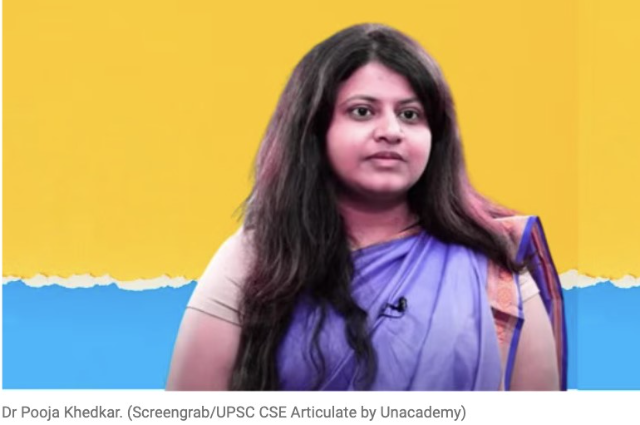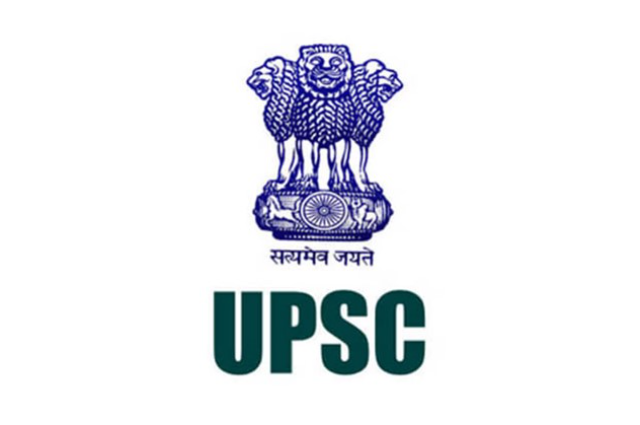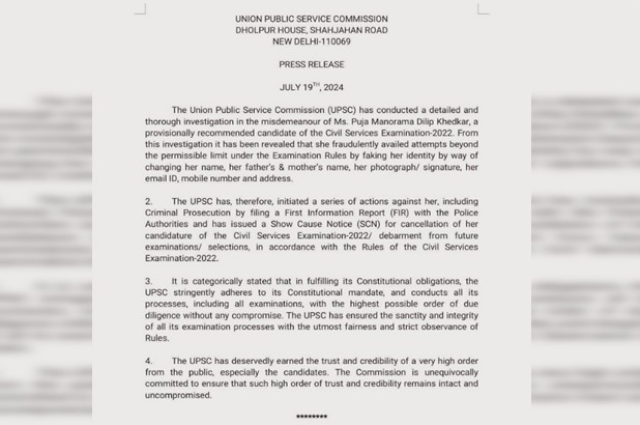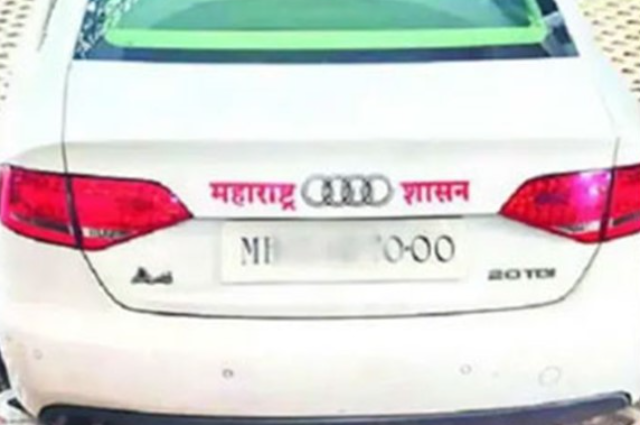
The Puja Khedkar case is still developing but the main details of this troubling story are now becoming clear. Khedkar, a 32-year-old trainee bureaucrat faces several serious allegations. She is accused of misconduct including forging an Other Backward Classes (OBC) certificate to claim non-creamy layer status despite her family possessing assets worth over ₹40 crore. Additionally, she allegedly used fake addresses and different spellings in forms to obtain a disability certificate. She even filled in false age and date of birth in the UPSC examination Form to sit for the Union Public Service Commission (UPSC) examination more times than allowed.
The Allegations and Their Implications
While none of these charges have been proven yet, Khedkar deserves a fair and thorough investigation away from media scrutiny. However, the several accusations against her and her family have triggered similar allegations against other current and former members of the Indian bureaucracy. Some are accused of misrepresenting their physical abilities to qualify under the disability quota while others have allegedly provided false information about their family incomes to be classified under the non-creamy layers category. These issues highlight the urgent need for stricter oversight of those who form India's administrative backbone.
The Government's Response and Broader Concerns
In response, the government has called Khedkar to the training institute again. However, a larger issue now appears which is the credibility of the UPSC selection process. There is a growing perception that caste and disability certificates are not adequately vetted which allows the system to be manipulated. This situation is unacceptable. The bureaucracy is a crucial part of India's governance serving as the primary interface between the state and its citizens. Civil servants and police officers wield significant power over India's 1.4 billion people and their ability to perform their duties depends on the trust placed in them by the public. This trust must not be undermined by rampant corruption.
The Need for Reform
In a country where ordinary citizens often struggle to obtain official documents for legitimate reasons, it is intolerable that some individuals can manipulate the system to gain undue advantages through affirmative action. The government must take decisive steps to ensure that the processes for verifying caste and disability certificates are robust and that any abuse of these systems is swiftly addressed. Restoring credibility to the UPSC selection process and maintaining the integrity of the bureaucracy is essential to uphold the trust and confidence of the Indian people.
How Documents Are Scrutinized in the UPSC Process?
The Union Public Service Commission (UPSC) plays a crucial role in the selection of candidates for various government services. This detailed process involves several stages to ensure the proper scrutiny of documents and the fair selection of candidates. Below is a comprehensive explanation of how this process unfolds.
i. Examination and Submission of Documents
The UPSC is responsible for conducting examinations and interviews on behalf of the Union Government. These steps are essential in recommending candidates for various government services. At the examination stage, candidates must submit documents to support their claims for reservation under different categories such as Scheduled Castes (SC), Scheduled Tribes (ST), Other Backward Classes (OBCs), Economically Weaker Sections (EWS), and Persons with Benchmark Disabilities (PwBD).
ii. Initial Inspection by UPSC
In the first phase of scrutiny, the UPSC reviews the documents submitted by the candidates. This initial review is strictly based on the documents provided by ensuring that the candidates' claims for reservation are supported by the necessary paperwork. This step is crucial for verifying the eligibility of candidates under the specified categories.
iii. Personal Interview and Medical Check-Up
After successfully passing the examination stage, candidates proceed to the personal interview. Post-interview, all candidates must undergo a medical check-up at government hospitals approved by the UPSC. This medical examination ensures that candidates meet the required health standards for their respective services. For candidates with benchmark disabilities (PwBD) then there is an additional step. They are required to appear before a medical board at the All India Institute of Medical Sciences (AIIMS) in Delhi. Here, the level of their disability is assessed to determine their eligibility under the PwBD category.
Final Verification by DOPT
Once all the documents are scrutinized and the medical check-ups are completed, the files are sent to the Department of Personnel and Training (DOPT). The DOPT is responsible for the final allocation of services by accommodating various reservation quotas. This ensures that the selection process is fair and that all eligible candidates are appointed to their respective services according to the established reservation policies. The scrutiny of documents in the UPSC selection process is a multi-stage procedure involving thorough checks and verifications. This process is designed to ensure that all candidates are fairly assessed and that their eligibility for various reservations is properly validated.
The Transfer and Allegations
In early July, Ms. Khedkar was moved from Pune to Washim in Maharashtra due to complaints from a senior officer accusing her of abusing her power. While serving as the Assistant Collector in Pune, Ms. Khedkar reportedly requested special perks such as a private office, residence, vehicle and staff, none of which she was authorized to receive. Additionally, it was revealed that she, a trainee officer and daughter of a retired bureaucrat who had run for the 2024 parliamentary elections from Ahmednagar, allegedly used fake disability and Other Backward Class (OBC) certificates to pass the civil services exam. In response to the controversy, the Department of Personnel and Training (DOPT) set up a one-person committee led by a high-ranking officer to investigate her application and credentials. This committee is expected to submit its findings within two weeks.
Previous Investigations and Rulings
Back in 2023, the Central Administrative Tribunal (CAT) ruled that although Ms. Khedkar had passed the exams, she avoided six medical tests required to confirm her disability at AIIMS, Delhi, leading to the conclusion that her application could be invalidated. This ruling was connected to a 2021 petition where she requested more attempts for Persons with Benchmark Disabilities (PwBD). Despite this ruling, she retook the exams in 2022 and with a rank of 821, obtained PwBD reservation benefits under a different category of disabilities— "visually impaired and hearing loss" instead of her previous application under "visual impairment and mental illness." Notably, the DOPT was involved in the 2021 petition. She managed to take the civil services exam 12 times by altering her identity and other details, although general category candidates are allowed six attempts up to the age of 32, OBC and PwBD candidates get nine attempts up to 35 and 42 years of age, respectively, and SC/ST candidates have unlimited attempts until 37 years of age.
Understanding the Probation Period in Civil Services: What is the Probation Period?
The probation period is an initial phase in a government job where new employees are evaluated. Typically, this period lasts for two years. However, if the employee needs to improve or has not passed the required exams at the training academy then the probation period can be extended up to four years. According to the Department of Personnel and Training (DOPT), the main purpose of this probation period is to judge whether the individual is fit to be permanently included in the service. It is not just a routine procedure but a crucial time to assess the employee's capabilities and suitability for the role.
What Disciplinary Actions Can Be Taken?
If a probationer fails to meet the required standards then they can be removed from their position. This can happen for several reasons such as not even passing the necessary exams at the training academy. Additionally, the Central Government can discharge a probationer if they are found to be ineligible for recruitment or deemed unsuitable for the service. This could be due to neglecting their studies or duties during the probation period or lacking the necessary mental and moral qualities for the service. In essence, the government has the authority to terminate a probationer if they do not meet the expected standards.
IAS Probationer Under Scanner: Maharashtra Govt. Suspends Puja Khedkar Amid Fraud Allegations
The Maharashtra government has suspended the probationary period of IAS officer Puja Khedkar and ordered her to return to the Lal Bahadur Shastri National Academy of Administration for further investigation. This decision comes after allegations surfaced regarding the authenticity of her disability and OBC certificates, which she allegedly used to secure her position in the civil services. Originally posted in Pune, Khedkar was transferred to Washim amidst these accusations. However, the government has now decided to recall her for further scrutiny.
Specific to the allegations of fraudulent activities, Pune police have been tasked with verifying the medical certificates submitted by Khedkar to claim the physical disability category. Authorities are investigating the origin of these certificates including the issuing of doctors and hospitals. Essentially, the government has placed Khedkar's career on hold while it conducts a thorough investigation into the validity of her qualifications and the methods used to obtain her position.
Investigation Uncovers Allegations and Company Links
An investigation by The Indian Express has revealed allegations of misusing caste and disability quotas, placing her family at the core of a network involving eight companies associated with their relatives and acquaintances. Records indicate that five of these companies operate from commercial addresses in Pune connected to Khedkar’s parents, Dilip and Manorama, who are under separate investigations for alleged legal violations. Collectively, seven of the eight companies are part of the Diligence Group with the eighth being Puja Automobiles, where Manorama is a partner alongside her husband’s brother-in-law. Among the Diligence companies is Thermoverita Engineering, which owns two luxury cars that have been part of controversies involving Puja and her father. The records show that its shareholders include Lata Bangar, Puja’s father Dilip’s sister and her husband Mahadev Bangar. The company's address is a commercial property owned by Manorama in Pune’s Talawade, which was also used by Puja to secure the ration card for her disability certificate.
A. The Diligence Group Network
- Overview of Diligence Group Companies: The Diligence Group comprises several companies including two focused on "sugar & agro" industries. These businesses list the Khedkar family, their close relatives, and associates as directors or shareholders.
- Investigation Findings: The Indian Express investigated the records of the Diligence Group and the associated automobile firm, interviewing key relatives and individuals named in these entities. Here are the findings:
Puja’s Stake and Family Involvement:
- In 2018, Puja (referred to as "Pooja" in records) held a 20% stake in Diligence Infraprojects.
- Her brother Piyush owned a 50% stake in Om Deep Sugar & Agro in 2022.
- Their mother, Manorama was a shareholder in three firms: Diligence Sugar & Agro, Diligence (India) Corporation and Diligence Infraprojects, until at least 2018.
Filing Irregularities:
With the exception of Om Deep Sugar & Agro, none of the other six Diligence Group companies have filed annual returns since 2019.
B. Mahadev’s Involvement
Dilip’s brother-in-law Mahadev is associated with four Diligence companies and is a partner in Puja Automobiles, a tractor dealership in Ahmednagar, Maharashtra. Mahadev claimed limited involvement by stating, “We are partners but the companies are now closed. There were other people involved as well. I don’t have much idea about these businesses. Khedkars are our relatives. Lata is Dilip Khedkar’s sister.”
C. Sancheet Hange’s Connection
Puja’s cousin Sancheet Hange is linked to four Diligence companies. At his farm in Pune’s Indapur taluka, Sancheet’s father, Tanajirao Hange, described himself as a farmer and former Congress office-bearer. Regarding the Khedkars using cars owned by a company where his son is a director, Tanajirao stated, “He (Sancheet) is a farmer by profession and I don’t know much about his involvement in the companies. Puja’s mother Manorama is my wife’s younger sister.”
D. Bendale Family Involvement
Kavita Bendale and her son Akash are named in five Diligence companies, including Thermoverita. When approached, Kavita described the Khedkars as “casual acquaintances” and said, “We know about the companies but don’t have any idea about their functioning or financials. We know the Khedkars casually. Our names are there because they (Khedkars) requested us.”
Company Registrations and Address Use
Akash Bendale is a shareholder in Om Deep Sugar & Agro Pvt Ltd, registered at a property owned by Manorama in Pune’s Sadanand Apartment. Two other Diligence companies are also registered at this address and a fourth used the address of a shop owned by Manorama in Pune’s Chandralok Apartment.
Legal Issues and Seized Vehicles
Pune Traffic Police seized an Audi used by Puja for multiple violations including misuse of an official beacon, VIP number plate and government emblem. Additionally, a video allegedly featuring Dilip in a Mitsubishi Pajero with a Government brass plate on the bumper is under investigation. Both vehicles are registered to Thermoverita. Last week, a court remanded Manorama to police custody for allegedly threatening farmers at gunpoint in Pune district in 2023.
Dilip’s Financial Inspection
Dilip, who retired from the Maharashtra Pollution Control Board in 2020 is under scrutiny for unaccounted wealth. The state’s Anti-Corruption Bureau has sought a report on his assets from its Ahmednagar unit. Records show he declared wealth of over Rs 40 crore and an annual income of Rs 49 lakh while contesting the Lok Sabha elections as a Vanchit Bahujan Aaghadi (VBA) candidate earlier this year by receiving 13,749 votes.
Why it's important to revisit the UPSC Exam and the importance of fair examination selection criteria?
There is no point in preparing for an exam wherein the whole selection criteria is fixed before even the examination and by default to get better ranks some people use their political connections or any nepotism influence to crack a Seat in the UPSC Exam. Imagine the kind of hardwork that one has to execute while preparing for these exams and later on those same candidates came to know that the exam was already fixed and the daughter or son of some big politician became an IAS officer. There is an important need to revamp the whole system though India is a democratic country still it requires several reforms as the whole UPSC Exam selection should be kept under check by some independent committee and members of these committees should include retired IAS officers.
Unbecoming Conduct Calls for Inquiry
Pooja Khedkar’s recent behaviour, as widely reported in the media and observed unofficially now appears to be quite inappropriate for an officer. This situation demands at the very least a thorough departmental inquiry. If these allegations are substantiated then they would signify a breach of various norms outlined in the Civil Services (Conduct) Rules of 1964. The decision to initiate disciplinary action based on the findings of the inquiry will rest with the cadre-controlling authority. For IAS officers, this authority is the Department of Personnel & Training (DoPT).
The Bigger Concern: Fake Certificates
However, this is not main primary concern. The more significant issue revolves around the allegations that Pooja Khedkar obtained fake disability and OBC (non-creamy layer) certificates. These allegations suggest that these fraudulent actions went unnoticed by the Union Public Service Commission (UPSC), which raises serious questions about the robustness of their screening processes.
Impact on the UPSC's Credibility
The complications of this case are deep. Firstly, it has the potential to undermine public trust in one of the nation’s most esteemed institutions. The UPSC is often viewed as a support of meritocracy, a place where nepotism has no place and only the most capable are chosen to serve the country. If this trust is eroded then it could have disastrous consequences as the UPSC is seen as a symbol of excellence and fairness.
Additionally, this case seems to reinforce many public suspicions about government operations, particularly the misuse of power and corruption. There is a prevalent belief that the system can be manipulated by those with wealth and influence. For many people this case confirms their worst fears; in India now one can circumvent the rules if they have the right connections.
The Impact on Reserved Category Aspirants
A 2021 study found that about 50 percent of candidates who cleared the UPSC Civil Services Examination came from reserved categories. For many individuals in the “non-creamy” layer of society, passing the UPSC exam represents a legitimate and hard-earned pathway to socioeconomic mobility. If this pathway is perceived to be compromised, it could severely damage the morale of the country’s youth which is something we must avoid at all costs.
The Focus is on the System not the Individual and the main point is that the problem lies not just with one person, Pooja Khedkar, but with the entire system she is part of. It suggests that there are larger issues within the system that allow for the situation to occur. The second part of the statement highlights how a system's strength is measured. It's not about preventing problems from happening entirely (like avoiding being hacked) but about how well it can handle and fix problems when they do occur. In simpler terms, a strong system is one that can quickly recover from such setbacks and resolve any challenges, difficulties and inefficiencies as soon as possible.
Disclaimer: The views expressed are personal and emphasize the need for urgent action to restore the credibility of the UPSC Selection process. This article is based on various facts and references taken from research blogs, Media resources and studies. This article doesn't attempt to hurt any sentiments and doesn’t discriminate among any groups, gender, sex or place of birth. The author and Reflections.live team are not liable for any sort of legal action against them. By reading this blog, readers give consent that the views in this article are factual based and readers might agree or disagree with the same for which they can’t sue the author or Reflections.live team or people associated with this blog directly or indirectly, for any sort of disagreements in case they have. Further Reflections.live team and the author have high regard and respect for all opinions.
. . .
References:
- https://www.newsinc24.com/news
- https://www.thehindu.com/news
- https://www.business-standard.com
- https://indianexpress.com/article
- https://www.hindustantimes.com
- https://indianexpress.com/article
- https://indianexpress.com/article
- https://indianexpress.com/article
- https://indianexpress.com/article
- https://indianexpress.com
- https://indianexpress.com
- https://www.hindustantimes.com





